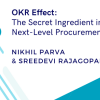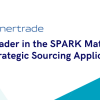Identifying and realizing synergies is critical for the success of any Merger & Acquisition say AArete's Matt Burelbach and Tyler Higgins, who also point out that nearly 89% of M&A-related reorganizations do not realize their full post-merger integration (PMI) potential value. They share how involving procurement can lead to financial, operational and technological synergies.
After a coronavirus-driven slowdown in activity, 2021 was a year of thriving M&A activity in the financial services space. There were 1,400+ acquisitions totaling more than $348 billion, with some notable M&A deals including Square’s purchase of buy now, pay later provider Afterpay; Visa’s purchase of open-banking platform Tink; and SoFi’s purchase of traditional bank Golden Pacific Bancorp.
Global M&A is projected to remain strong in 2022. As valuations reach historic highs, the pressure on deals to achieve meaningful value has never been greater. The financial sector — including private equity — played a pivotal role in the M&A activity story in the first few months of 2022. PitchBook reported that 501 financial services deals, worth an aggregate $102.8 billion, were closed in the first quarter.
While identifying and realizing synergies is critical for the success of any M&A deal, nearly 89% of M&A-related reorganizations do not realize their full post-merger integration (PMI) potential value. While each deal is unique, all organizations must prioritize financial, operational and technological synergies.
Four Critical Areas for Procurement’s Involvement
The sooner the procurement organization is involved in supporting the deal, the better. Procurement leaders are critical to driving a future state target operating model and ensuring successful realization of synergies; they must establish themselves accordingly. Outside firms will typically support these efforts, but procurement teams must be focused on establishing a PMI process that empowers the organization to accelerate and maximize the value realized from all available synergies.
Procurement organizations play a critical role in not only delivering hard-dollar cost savings and contract synergies, but also enhanced processes and technology platforms. Procurement leaders are uniquely positioned to have visibility and access to all areas of an organization. This includes every vendor contract, every internal technology and every support function – all necessary to realize the bottom-line value from an integration.
1. Data Integration
When two or more organizations merge, there are several challenges that organizations face with respect to data integrity and critical information gaps when integrating other firms’ information and reporting into their combined environment. Procurement teams need to lay the correct foundation on day zero to ensure successful execution. Effective Master Data Management identifies the critical data parameters for every data set and homogenizes the data of the combined entity allowing it to become more actionable.
2. Process Harmonization
Integrations breed new processes. Undefined and inconsistent processes and workflows across merging entities pose a major threat to fully realizing integration synergies. Procurement leaders need to work with key stakeholders to precisely define the processes for every relationship with their internal business team and conduct working sessions to identify and mitigate potential risks and issues.
3. Stakeholder Management
Integrations, by nature, are large undertakings requiring the right people and teams in place at the right time. Procurement teams can proactively elevate the need for added resources when many organizations struggle to act quickly and hit their integration goals while maintaining business as usual with current staffing levels.
4. Technology Optimization
One of the biggest integration challenges is the migration of users and data from legacy systems to the parent companies’ systems. IT procurement leaders have visibility into a wide range of technology needs. Being fortunate as a crux to cross-integration decision-making, procurement teams can support streamlining operations to create a best-in-class model for technology migration.
M&A deal activity in financial services shows no signs of slowing down. It is incumbent upon procurement to be ready and get involved – even before closing. The most successful integrations are built around early planning and a focus on action, not just updates. Procurement leaders can be that engine to drive successful efforts and maximize the value from synergies.









